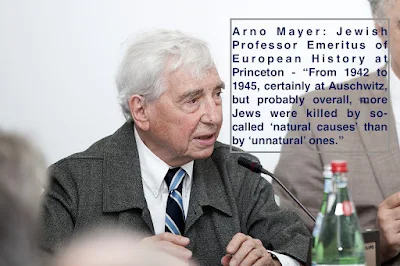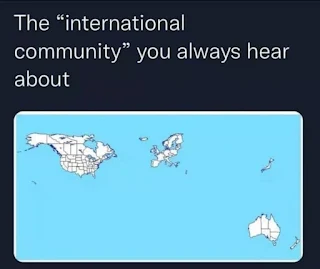It gets a harder and harder to ignore the hypothesis that mankind is a social experiment for the global oligarchy when we understand how contrived the wars and ideologies are. This is a classic interview by Professor Antony Sutton, who taught economics at California State University, and was a research fellow at Stanford University's Hoover Institution.
Wednesday, 15 August 2012
The Best Enemies Money Can Buy - Wall Street Manipulation of Humanity Through Fake Wars & Fake Ideologues
It gets a harder and harder to ignore the hypothesis that mankind is a social experiment for the global oligarchy when we understand how contrived the wars and ideologies are. This is a classic interview by Professor Antony Sutton, who taught economics at California State University, and was a research fellow at Stanford University's Hoover Institution.
Tuesday, 5 March 2013
John Kerry's Secret Society At Yale - The Order by Professor Antony Sutton
Thursday, 11 January 2018
An Intellectual Review of Trump | Victor Davis Hanson
Monday, 26 December 2016
James Perloff. The Shadows of Power; the CFR and decline of America
Thursday, 1 March 2007
The White Album
England’s strongest side since 1966 they said. The newspapers did, mates who actually watch football and know a thing or two constantly reminded me in the run up to the tournament. It was all over the interweb, the TV pundits sang victory in unison, and even the Go-Go dancers at Long Gun on Soi Cowboy knew that England had a chance of raising the cup and for a fleeting second, wink at the world and say, ‘see, told you we’re the best’.
Have you read my 11:11 11/11 post?
Friday, 4 October 2013
In The Shadow of Hermes - Jewish Bolshevism - 20 Million Dead
The descriptions are stomach churning.
Monday, 6 August 2007
Long Play
Late in the afternoon last week for no apparent reason the phone started ringing off the hook with work things. So I dragged my sorry rear into the West End mainly to get off my well honed reclining-position as earlier I'd been sucked into responding to Robs post to cover my partially exposed butt on brand values. Frankly I was close to bailing out Stateside for an overdue meetup, but a combination of a delayed reply that I've been waiting on, filed in 'the dog ate my emails' folder, and a sudden offer to get stuck into some charity rebranding tipped me over to taking on a gig on that meant a 4am start the next day up in Glasgow doing groups. These included in the afternoon, some young men who don't necessarily think too much about being electronically tagged while keeping a curfew - yeah Punk Planning my friends.
So far its been an exhausting but eyeopening experience and since the kickoff I've also covered Cardiff, a small mining village in the county borough of Caerphilly as well as Sutton Coldfield near Birmingham and Gloucester today. I should wrap up in a few days time but until then I've started to ask myself if the idea of an open source C.I development methodology might be an effective way to meet the objectives of keeping a very disparate bunch of people that range from local government, charity workers and young folk in need of a helping hand onboard and 'buying into' a process which one guy memorably articulated as 'reeking of insincerity' when referring to the the way 'brand' talks.
Here's the deal; most of the people that I've spoken to are really sceptical of anything that relates to marketing and the reason for that is they actually do stuff rather than waffle on about it like a lot of us ad tossers do. Its also increasingly evident that as with any change management a shiny new badge can be a reasonably useful point to coalesce around for a new direction. The reality is that unlike that rare and mythical beast called a proper brand (people getting mugged for Levis in 80's Moscow and ditto for iPods in the 3rd millennium) they probably will never be more famous than say top of mind prompted-recall within a specific charity segment, even if as I have discovered time and again since last Thursday they are off-the-richter-scale for complexity in stakeholders and financial solutions. Not to mention diversity of projects and doing a lot of hands on work.
I'm probing some architecture, platform and proposition dimensions that are not far removed from interrogation of (deep breath) third party projection of the meaning-of-meaning for say deprived young'uns with low attention spans - you get my drift? OK I'm exaggerating a tad, but that whole brand personality malarkey isn't moving mountains for me if people have to think about it. I mean personality is surely something people can spontaneously remark on and unwittingly have, acquire and possibly nurture. Surely its not something that can be scored from the nearest council estate corner gathering, and falls neatly between say a "chav" brand and one that "tells you what to do" as one group earlier today outlined when discussing those "Just do it" people. I guess I'm taking shots at some of the FMCG navel-gazing research gigs I've had to oversea in my time. But there is some overlap with whats going on here.
So in the interests of suggesting a kick-ass methodology for a participatory media process that embraces uncertainty and welcomes the digitalocracy of the web I thought I'd run the idea past you folk in case anyone else has thought about the idea of opening up the development of identity architecture real-time on the web. The immediate pluses for this method are that everyone gets a say and feels that they have been part of the consultation process, one or two egos/agendas don't hijack the process as invariably happens when settling on a least contentious communication platforms. Any thoughts? Is this taking 2.0 a bit far? Could it all go peaches up or as I really suspect, the P.R from the process could be worth considerably more than a years communication budget, given that nobody has ever done it before and that somebody will surely be extremely upset about the loss of control - which is a good thing in my book.
Other than that there are a quite a few other things kicking off and I'll leave you with the best post for ages. If any of you wannabes want to know what planning is about then check out this slice of action that absorbs people of our stargazing ilk who can't ever help stop thinking - albeit in my case pretty uselessly. It also gives me a chance to use that picture of ChinaD0II that has been lurking on my desktop before I dig out some of the great podcasts I'm still gagging to tip y'all off about.
Friday, 8 November 2019
Southampton Warriors
Make your own mind up if you've got an attention span longer than a poppy pin.
Friday, 31 January 2014
Wall St Connections to the Bolshevik Revolution
Update: Tom deleted his analysis as you can see above.
Thursday, 16 February 2023
NATO
NATO (the North Atlantic Treaty Organization) is a military alliance between North American and European countries that was established in 1949 to ensure Russia and Germany never fought on the same side. The alliance was formed spuriously in response to the threat posed by the Soviet Union and its Warsaw Pact allies during the Cold War, even though all those years of posturing and propaganda were synthetic as the Hoover archives demonstrated once Tony Sutton D.Phil collated the evidence and published it. People realised the Germans lost WWII but the Nazis won it in part through Operation Paperclip and other less documented channels.
Additionally, NATO's commitment to collective defence has been criticized for leading to a lack of accountability. The alliance operates on the principle that an attack on one member is considered an attack on all members. This has led to military interventions without proper debate or consideration of the long-term consequences. The gravity of this is not missed despite no country ever declaring war on a NATO member. Trigger happy doesn't quite encapsulate the visceral inversion that only the memory wipes are incapable of recalling.
Furthermore, NATO's focus on military power as a means of achieving security has been singled out by historically prominent states people for neglecting diplomatic solutions, and addressing the 2014 root causes of conflict, for example, in The Ukraine. Some argue that NATO should prioritize diplomacy and conflict resolution, rather than relying on military force, fictitious claims of weapons of mass destruction and invading the wrong country for possible opportunism and then high tailing it, and leaving billions behind in military hardware as was the case in Afghanistan.
































